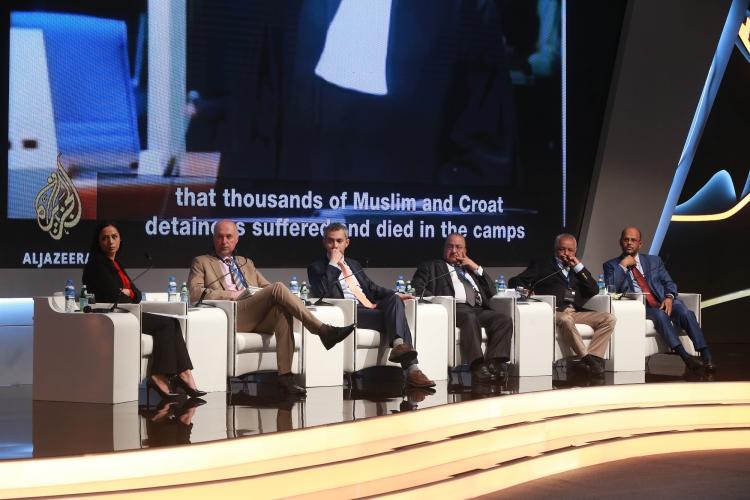
As the 11th Al Jazeera Forum, “State Crisis and the Future of the Middle East”, heads towards its conclusive stage, the theme moved from past crises to present challenges and how to deal with them in the future.
The fifth plenary session on the forum’s second day saw panelists exploring the theme, “A Hundred Years after the Balfour Declaration: What does the existence of Israel mean for the region?”
Director of the Centre for Modern Oriental Studies at the Sorbonne University Burhan Ghalioun explored the reasons behind the failure of nation states from transitioning from the lack of self-determination and slavery into freedom, peace, political participation to becoming a burden, catastrophe, and a source of corruption and religious problems by turning into a tool for oppression and segregation of people.
Highlighting the defect in this process, Ghalioun underscored the need for having a nuanced understanding of the issue, which boils down to how the Arab states were worse for their people post-colonisation than colonial rule. The reason, he said, is because the states depend on superpowers to find legitimacy and salvage their own powers, hence turning the dream of nation state into a tool for slavery.
Following on, Amani Senwar, who is a researcher in human rights and international relations, boldly stated that the West is keeping the Arab world under an illusion of a two-state solution while backing Israeli aggression against the Palestinian people.
She lamented the inaction from the Arab world with regards to the two-state solution by saying, “There is no such thing as an Arab initiative as the Arab world is engulfed in its own crises. Arab alignments and Iran’s expansionist agenda in the region mean that Israel is taking advantage of the situation and presenting itself as being more moral and ethical in its dealings than the Arab regimes who are massacring their own people”.
Speaking in defence of the Iranian point of view was Iranian Diplomat and the Chairman of the Palestine Committee in the Culture and Islamic Relations Organisation Abbas Khamayar, who steadfastly defended the Iranian regime’s handling of the Israeli problem.
The Iranian perspective, Khamayar said, understands that the ambitions of Israel are deeper than some Arab officials envisage and focuses on the reality of Israel and the existential threats it poses by being an imperial, colonial and Western presence in the heart of the Arab world.
In an impassioned intervention, the Iranian diplomat said that Iran’s stance underlines that Israel is the root cause of all conflicts and its continuation means the continuation of colonial powers in the region.
He concluded by calling for reconciliation between the Arabs and Iranians, which could “lift the lid on Israel and its agenda”.
The last speaker in this heated debate was the former Palestinian ambassador and founder of the Australia-Arab Affairs Council Ali Kazak who called on the Arab states to hold Britain and Anglo-Saxon states accountable for the actions of Israel by being the creators of the Balfour Declaration.
Kazak said we must ask all the Arab states that have alliances with Britain to put pressure on the former colonial power to allow Palestinians to go back to their own lands. Accusing the Arab governments of acting against the rights of the Arab people, he said that Arab rulers make statements against Israel and send donations to the Palestinian people but that they are far less than the expenses made in “other areas”.
He said it was also the responsibility of businesses, student unions, parliaments and journalists to mobilise people and put pressure on their respective governments to adopt serious policies against “enemy states”.
Accusing Arab countries of competing against each other to further their relations with “allies of Israel”, Kazak said the Arab world must link commercial interest with political interest and put economic pressure on these allies to adopt policies in keeping with international law.
“Israel is a source of suffering, of occupation, of war. It is destabilising the Arab world so we must act, not by waging war but by channeling our investments in favour of the rights of and stability for Palestinians and the rest of the Arab world or history will not remember us favourably”.

